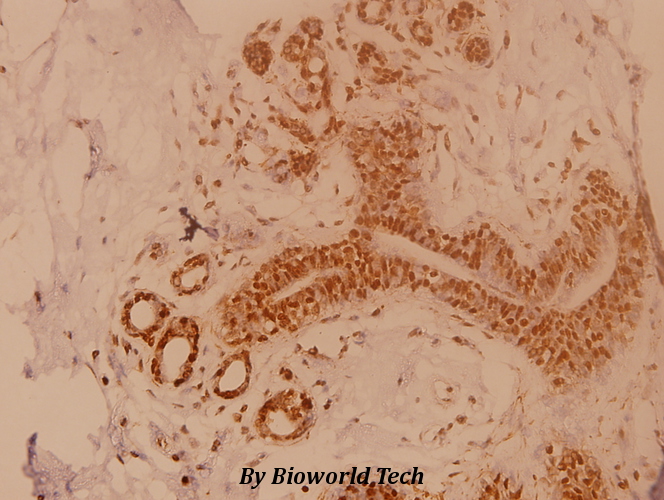Product Name :
Dok-1 (R392) polyclonal antibody Background :
Dok-1 associates with the Ras GTPase-activating protein (Ras GAP) upon tyrosine phosphorylation. Evidence suggests that Dok-1 (also designated p62dok) is a substrate of the constitutive tyrosine kinase activity of p210 Bcr-Abl, a fusion protein caused by the t(9;22) translocation and associated with chronic myelogenous leukemia. Dok-1, as well as the tyrosine kinase substrates IRS-1 and Cas, are members of a class of “docking” proteins which contain multiple tyrosine residues and putative SH2 binding sites. Dok-1 is suspected to be the substrate phosphorylated in response to stimulation by a number of growth factors, including PDGF, VEGF, insulin and IGF. Product :
Rabbit IgG, 1mg/ml in PBS with 0.02% sodium azide, 50% glycerol, pH7.2 Storage&Stability :
Store at 4°C short term. Aliquot and store at -20°C long term. Avoid freeze-thaw cycles. Specificity :
Dok-1 (R392) polyclonal antibody detects endogenous levels of Dok-1 protein. Immunogen :
Synthetic peptide, corresponding to amino acids 360-408 of Human Dok-1. Conjugate :
Unconjugated Modification :
Unmodification
Dok-1 (R392) polyclonal antibody Background :
Dok-1 associates with the Ras GTPase-activating protein (Ras GAP) upon tyrosine phosphorylation. Evidence suggests that Dok-1 (also designated p62dok) is a substrate of the constitutive tyrosine kinase activity of p210 Bcr-Abl, a fusion protein caused by the t(9;22) translocation and associated with chronic myelogenous leukemia. Dok-1, as well as the tyrosine kinase substrates IRS-1 and Cas, are members of a class of “docking” proteins which contain multiple tyrosine residues and putative SH2 binding sites. Dok-1 is suspected to be the substrate phosphorylated in response to stimulation by a number of growth factors, including PDGF, VEGF, insulin and IGF. Product :
Rabbit IgG, 1mg/ml in PBS with 0.02% sodium azide, 50% glycerol, pH7.2 Storage&Stability :
Store at 4°C short term. Aliquot and store at -20°C long term. Avoid freeze-thaw cycles. Specificity :
Dok-1 (R392) polyclonal antibody detects endogenous levels of Dok-1 protein. Immunogen :
Synthetic peptide, corresponding to amino acids 360-408 of Human Dok-1. Conjugate :
Unconjugated Modification :
Unmodification
-

-
 Immunohistochemistry (IHC) analyzes of Dok-1 (R392) pAb in paraffin-embedded human breast carcinoma tissue at 1:100.
Immunohistochemistry (IHC) analyzes of Dok-1 (R392) pAb in paraffin-embedded human breast carcinoma tissue at 1:100.
Bioworld Biotech only provide peptides for our antibodies and do not provide additional peptide customization services.
Price/Size :
USD 368/1mg/vial
Tips:
For phospho antibody, we provide phospho peptide(0.5mg) and non-phospho peptide(0.5mg).Describe :
Blocking peptides are peptides that bind specifically to the target antibody and block antibody binding. These peptide usually contains the epitope recognized by the antibody. Antibodies bound to the blocking peptide no longer bind to the epitope on the target protein. This mechanism is useful when non-specific binding is an issue, for example, in Western blotting (WB) and Immunohistochemistry (IHC). By comparing the staining from the blocked antibody versus the antibody alone, one can see which staining is specific; Specific binding will be absent from the western blot or IHC performed with the neutralized antibody.Formula:
Synthetic peptide was lyophilized with 100% acetonitrile and is supplied as a powder. Reconstitute with 0.1 ml DI water for a final concentration of 10 mg/ml.The purity is >90%,tested by HPLC and MS.
Storage:
The freeze-dried powder is more stable. For short time at 2-8°C. For long term storage store at -20°C.
Note :
This product is for research use only (RUO only). Not for use in diagnostic or therapeutic procedures.
 Dok-1 (R392) polyclonal antibody
Dok-1 (R392) polyclonal antibody  Datasheet
Datasheet COA
COA MSDS
MSDS SHIP
SHIP